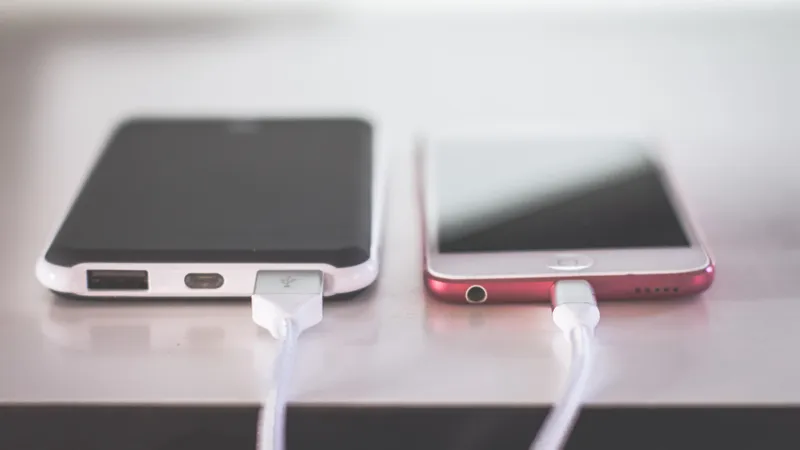Add, remove & assign phone numbers on demand
Manage, respond to, and share calls with your team
Send & receive any message you need to
Keep contact details in one place with a shared phonebook
For on-the-go teams to share messages, calls, and contacts
A full directory of all our included features

Pros and cons of having two phones

Compared to even a few years ago, a small business owner now has to deal with an exponentially high number of calls and messages. Considering the need to streamline that communication, which can be both personal and professional, some choose to carry two phones. But before you do that, it’s important to know about the pros and cons of having two phones.
Contents:
Why do business owners carry two phones?
Pros of having two phones
Cons of having two phones
Dual SIM phones: The advantages and disadvantages
eSIMs: The benefits
Get separate numbers without separate phones
Advantages of using a VoIP number as your work number
Chalkboard: Helping you to separate work and personal communication
Second phone number FAQs
At an organisational level, particularly for medium and large enterprises, the solution is to roll out a customised BYOD or Bring Your Own Device policy. But for small business owners and entrepreneurs, it might appear that carrying two phones is a practical remedy. If you’re already doing it or planning to do so, here’s everything you need to understand about the pros and cons of having two phones.
Why do business owners carry two phones?
Business owners carry two phones for a variety of reasons, such as enhanced security, convenience and productivity. With two phones, business owners believe that it’s the easiest way to separate personal and business communications, ensuring that their professional conversations are kept secure and private.
Two phones also enable business owners to easily switch between work-related calls and personal calls. Even before they identify who’s calling them, they will know whether the call is work-related or personal merely by knowing which device is ringing.
In addition, some entrepreneurs believe that multiple phones can help increase their productivity. With two devices, they can respond to emails and messages faster, thus increasing their response time and boosting customer satisfaction. Multiple phones also enable business owners to take advantage of different network providers and save on international roaming fees when travelling.
Research shows that a large proportion of small businesses use at least two different mobile devices. Nearly one-third of survey respondents said they utilise three or more devices. Overall, carrying two phones can help business owners improve their security, convenience and productivity.
Whether or not they’re aware of the pros and cons of having two phones, there’s another reason why small business owners do it. That was originally the only option. There may not have been another option when they started doing it and they would have seen their peers do it. So, having two phones became the default mode.
Pros of having two phones
1. Prioritisation
Carrying two phones allows business owners to easily access and prioritise their phones. This can be very convenient in situations where you need to quickly identify whether an incoming call or message is work-related or personal.
2. Security
If one phone is only for work, there is less chance that important data will be compromised. This can be especially helpful if your work involves confidential information or sensitive data. Similarly, your personal data will be protected from company access.
3. Organisation
You can easily organise your contacts, emails and messages between the two phones and keep them separate, making it easier to manage your day-to-day activities. This will help you achieve a better work-life balance although you don’t need two devices for that.
4. Cost savings
In certain instances, with two phones, you can save money on your mobile phone plan since you won't need to use as much data or as many minutes as you would with one phone.
5. Battery life
Having two phones means that you can have one phone for personal communication and for entertainment. You can dedicate the other phone for business calls and messages. This helps you conserve battery life since one phone won't have to do it all.
6. Storage
While discussing the pros and cons of having two phones, one shouldn’t overlook the storage aspect. Two devices give you more space to store your data without having to run out of space and buy cloud storage.
Cons of having two phones
1. Increased expense
The biggest problem with carrying two phones is that you have to buy two devices. If the organisation reimburses the expense, it may not be a problem for an employee. But for small business owners and working professionals, this is an expensive proposition.
2. Inconvenience
Carrying two phones can be very inconvenient, as you must keep track of two devices and manage two phones and plans from two separate providers. If you have devices from two different manufacturers, you also have to carry two chargers.
3. Electricity consumption
Carrying two phones can often mean that both devices need to be charged more frequently to ensure there is enough battery life to use both phones. This can increase your electricity consumption charges.
4. Confusion
If you are not used to carrying two phones, you could easily become confused or forget which phone you are using for which purpose.
5. Customer service
If your phone numbers are from different providers, it would be cumbersome to contact two different customer service departments if you have any problems.
Dual SIM phones: The advantages and disadvantages
While exploring the pros and cons of having two phones, a potential solution would appear in the form of dual SIM phones. A dual SIM phone is a device with two SIMs, allowing it to support two separate phone numbers, contact lists and call histories.
Some dual SIM phones also allow users to switch between different networks on each SIM without having to physically remove and replace the card. This gives users access to lower rates and more convenient data plans. The most popular manufacturers of dual SIM phones are Samsung, Huawei, Nokia and Apple.
Advantages of dual SIM phones
1. Cost savings
One of the most obvious advantages of dual SIM phones is that it allows users to save money on their device expenses and mobile phone bills. There is no need to buy an additional device. By having two SIM cards, users can also switch between a lower-priced local provider and a higher-priced international carrier, depending on their needs.
2. Convenience
Dual SIM phones are ideal for people who travel frequently or who have jobs that require them to be in multiple locations. With two SIM cards, users don't have to worry about switching phones or carrying multiple devices when they are on the go.
3. Multi-tasking
With two SIM cards, users are able to keep their personal and work lives separate and manage multiple conversations at the same time. This makes it easier to stay on top of important messages and tasks without getting overwhelmed.
4. Separate networks
Dual SIM phones allow users to access two different networks which can be useful in areas where one service provider has weak coverage.
5. Security
Having two SIM cards means that in case one gets lost or stolen, the other one is still available for use. This provides an extra level of security and peace of mind for users.
Disadvantages of dual SIM phones
1. Limited battery life
The presence of two SIMs in a phone can cause battery drain, as the phone may struggle to support both cards simultaneously. This can also affect your data usage and access to the internet.
2. Increased bulk
The presence of two SIM slots means that the size of the phone increases to accommodate them, making it bulkier, even if marginally, than a regular single-SIM phone.
3. Cost
Dual SIM phones usually cost more than their single SIM counterparts, due to the additional hardware and software required to support two cards.
4. Compatibility issues
Some dual SIM phones are not compatible with certain network providers and will not be able to access the services offered by them.
5. Security risk
Having two SIMs in one phone poses a greater security risk, as malicious actors could use one SIM to access information stored in the other.
eSIMs: The benefits
Any discussion on the pros and cons of having two phones should also include eSIMs or embedded SIMs. These are a type of interchangeable SIM cards pre-installed in a device that allows users to connect to a mobile network without using a physical SIM card.
eSIMs are becoming popular in smartphones and other connected devices, including wearables, smartwatches and tablets. With an eSIM, users can switch between providers and plans without having to swap out their physical SIM card. These are some of the advantages of eSIMs:
1. Increased security
eSIMs provide an added layer of security, allowing users to remotely download and update their SIM profiles with updated encryption and authentication protocols. This means that the data transmitted by a phone is more secure than if the traditional physical SIM card were used.
2. Reduced cost
eSIMs are much more cost-effective to manufacture, as they don’t require physical SIM cards. This can benefit both manufacturers and consumers, as the cost of mobile devices can be reduced.
3. Reduced size
eSIMs do not require a physical card, which can help reduce the size of cellular-enabled devices. This means that devices can be smaller, more lightweight and more portable than before.
4. Global connectivity
With eSIMs, users have the ability to switch between networks without having to purchase multiple physical SIM cards and swap them out on their devices. Users can travel to different countries without the hassle of having to buy multiple networks’ SIM cards and change them when they get there.
5. Easier setup
When using an eSIM, users don’t need to worry about manually inserting a physical SIM card into their device. Users also don’t have to worry about losing or damaging their SIM cards.
Get separate numbers without separate phones
Why are business owners interested in the pros and cons of having two phones? Because everyone knows that there’s a serious problem. But increasingly, people are also aware that the current solutions are inadequate.
Calling or messaging your customers or colleagues from a personal phone number makes it difficult to maintain a work-life balance. It exposes your private number to scammers and robocalls. Not having a dedicated number for work also makes you appear less professional and therefore, less credible.
As the pros and cons of having two phones show, while it has some benefits, it can also be costly and impractical. What you need is a solution that gives you all the advantages of having two separate numbers but without any of the associated problems.
What you need is a virtual number. With a VoIP (Voice over Internet Protocol) service, you can get convenient access to a second phone number without a separate data plan or device. All you need is a mobile app and an internet connection to start using two phone numbers on one phone. Chalkboard makes this easy.
Advantages of using a VoIP number as your work number
1. Cost savings: You don’t have to buy a new device to get a number. A VoIP number is merely an application. VoIP makes and receives calls over the internet instead of over a traditional landline or cellular network. This also means lower calling charges.
2. Flexibility: VoIP numbers can be used from any device with an internet connection, allowing you to make and receive calls from any location. Now your smartphone, tablet or laptop can become your business phone.
3. Mobility: Since they’re not tied to a particular physical location, you can take your number with you wherever you go. This is great for businesses with remote and hybrid employees or business owners who travel often.
4. Advanced features: Top-rated VoIP numbers such as Chalkboard come with advanced features such as contact organisation, auto-reply, broadcast SMS, voicemail and more that are not available on traditional landlines or mobile phones.
5. Reliability: VoIP service providers are generally more reliable than traditional landlines, as they are not susceptible to power outages or service disruptions due to inclement weather. With increased internet connectivity and higher speeds, they can work almost anywhere.
6. Analytics: You need to know how you use your business phone to improve your communication. With a VoIP number, you get data on how many calls come in and who’s answering those calls. These can help you analyse and improve your customer service and marketing.
Chalkboard: Helping you to separate work and personal communication
Those looking for two phones are looking for a way to separate their work and personal lives. Carrying two phones is a short-term and unsustainable solution that can lead to faster burnout.
The right solution is Chalkboard, a virtual number designed for the needs of small business owners, freelancers, independent creatives and startups. Here’s why Chalkboard is a superior alternative to carrying two phones:
You get a number for work: You can use this virtual number for all work-related calls and messages and freely share it with your customers and business associates.
No need for a new phone: Why needlessly spend on a new smartphone when you can download the app and get started in minutes? Also, let’s not forget, there’s only one phone to charge and carry around.
Ideal for remote work: You can use this number on any connected device. You can also route calls to remotely placed employees with ease.
Separate lists: Chalkboard allows you to organise your business contacts according to their preferences and needs, which will help you build a customer base. It will also make it easy to search for them.
Group broadcasts: Send the same message to multiple customers without typing them out manually with broadcast SMS. This is how you automate the marketing of your small business.
Number sharing: You can share team numbers with Chalkboard. So, if you’re too busy to answer an incoming call, someone else can do it.
Auto-reply: Can’t take a call? The auto-reply feature will send a pre-written message to the callers explaining why you’re unavailable and when you’ll get back.
Affordability: Chalkboard is designed for small business owners and has exceptionally affordable rates. Choose a number and download the app, after which you only need to pay a small charge for your number each month.
Second phone number FAQs
Why would someone need a second phone number?
As a small business owner or professional, you need a second phone number to seal your professionalism, have a dedicated line for your customers and colleagues to reach you and separate your work and personal lives.
How do you get a second phone number?
You can either get a new SIM and device or buy a dual SIM device. But the smartest and easiest way to get a second phone number is by downloading a VoIP app such as Chalkboard.
Can you use a second phone number for business purposes?
Small business owners can – and should – use a second phone number exclusively for business purposes to streamline their communication and improve customer service and marketing.
Are there any drawbacks to using a second phone number?
If you’re using a VoIP number, the only potential challenge is that you do need an internet connection for it to work.
Are there any good apps for managing a second phone number?
Some of the top-rated second phone number apps are Chalkboard, Google Voice, Grasshopper, TextNow and Burner. Of these, Chalkboard is the only one designed specifically for small business owners, freelancers, working professionals and independent creatives.

Continue reading
Read this complete guide if you’re considering implementing a BYOD policy for your business
Using a personal phone for work? That’s a big no-no. By differentiating between work and personal calls, on one phone, work is more manageable and you don’t have to check two phones constantly




